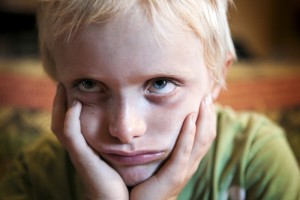As the name suggests, Attention-Deficit Hyperactivity Disorder (ADHD) is used to describe a condition whereby children have problems with attention and/or hyperactivity. Generally symptoms must be present by age 7, and be noticeable in multiple contexts (e.g., home, school, with friends), not just when the child is doing something that they don’t like or find boring.
Signs of hyperactivity
- Difficulty waiting and taking turns
- Constant fidgeting
- Difficulty sitting still and playing quietly
- Lots of running about (as if the child is driven by a motor engine)
- Climbing on things
Signs of inattention
- Starting one task before finishing the last task
- Distractibility
- Day-dreaming
Some children predominantly show signs of hyperactivity, others have predominantly inattentive symptoms, and some children experience both.
Treatments for ADHD
The primary treatments currently used for children with ADHD are behaviour therapy, medication, or a combination of both.
Behaviour Therapy
The aim of behaviour therapy for children with ADHD is to provide clear and consistent expectations for how you want the child to behave as well as immediate and short rewards and consequences for appropriate and inappropriate behaviours, respectively. These limits are enforced consistently at home (by all caregivers) and at school. Time-out and withdrawal of privileges are amongst the most effective consequences to decrease the frequency of inattentive and hyperactive behaviours. It is equally important to praise and reward any positive behaviours observed such as turn-taking, waiting patiently, concentrating, staying on task, persistence with tasks, etc). Behaviours that are praised and rewarded are far more likely to increase over time.
Medication
- Clinical psychologists provide psychological strategies for ADHD and do not prescribe medication but sometimes they may suggest a referral to a paediatrician to discuss this if they feel that this would be beneficial.
- The two most common medications used for ADHD are the stimulants Ritalin (methylphenidate) and dexamphetamine. Non-stimulant medication such as Strattera (atomoxetine) can also be used for treatment. These medications can be prescribed by a paediatrician or psychiatrist after thorough assessment.
- Clinically, the effectiveness of ADHD medications seems to vary from child to child. Some parents report significant improvements whilst others report little change.
- Of the medications prescribed for ADHD, Ritalin is the most studied and there is some evidence of its benefits, at least in the short-term. Studies have shown that Ritalin is associated with better controlled behaviour in the classroom, improved relationships with peers, better compliance with requests from adults, and improved academic performance.
- The more common side-effects that have been reported in some children include decreased appetite, insomnia, increased anxiety, and/or irritability. Some children report mild stomach aches or headaches. These side-effects tend to be related to the dose of medication being taken, with higher doses producing greater side-effects.
- Unfortunately, due to the relatively recent prescription of these medications there is very little information about their long-term effects. However, some emerging research suggests that the medications may stop having a therapeutic effect after the child has been taking them for a number of years.
If you would like to find out more about our treatment for ADHD in children, or to book an appointment with one of our child clinical psychologists who provides assessment and treatment for this condition, please make an enquiry or call the clinic on 02 9438 2511.

